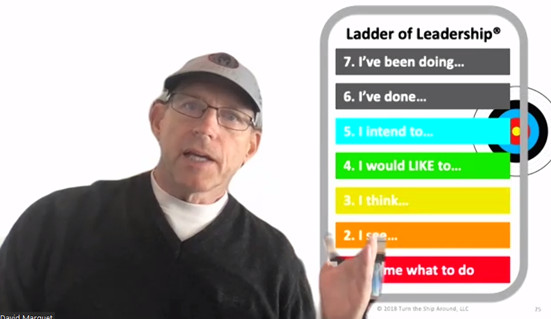Today on Unleashed we welcome David Marquet and our own Jeffrey White.
We’ve referenced David’s work in several past articles. In 1981, he graduated top of his class from the U.S. Naval Academy—an institute renowned for developing “leaders to serve the nation.” Thereafter, he joined the submarine force where he spent nearly 30 years, ultimately retiring as Captain in 2009. David has since authored the books, Turn The Ship Around, which outlines his unique approach to leadership and Leadership is Language: the hidden power of what you say, and what you don’t.
Jeffrey White joined the Royal Canadian Navy as a Direct Entry Officer in 1996 following the completion of his BSc in Marine Biology from the University of Guelph. After completing his Naval Warfare Officer training, he joined the West Coast fleet in 1998 as a Sub-Lieutenant serving in all Ships’ Officer positions including Navigating Officer for HMCS BRANDON and culminating in Command tours of both HMCS EDMONTON and HMCS SASKATOON. Following two successful commands, he was then given the prestigious appointment of Commanding Officer of the sail training ship HMCS ORIOLE, the Royal Canadian Navy’s longest-serving vessel, which he commanded from 2006-2008. Today he is a key member of the Results team and continues to serve as a leader in the reserves while managing a busy household of five children with his wife Kerry.
Episode Highlights:
- David reinforced what we heard from Mark Crowley on last week’s episode, that many organizations are following an outdated model of leadership. The command-and-control, head down and just do the job approach was fine during the industrial revolution but doesn’t cut it in today’s workplace.
- He had great success in his military career, most notably as Commander of the Santa Fe Submarine, by using the principle, “I refuse to give orders. The job of the leader is not to make decisions, it’s to create a team that makes good decisions and then does good work.”
- There are two things an employee needs to have to be effective in this type of leadership environment: technical confidence and clarity of the purpose or direction of the mission. David gave the example: “I won’t tell you what to do, but let me re-explain the mission…”
- Performance should not be measured by right or wrong. There are two vectors – the quality of the decisions and the quality of the learning. Leaders must be willing to run experiments, have tolerance for experimentation and let people run with their own ideas.
- The goal is commitment, not just compliance. Compliance is when someone does what they’re told, follows the steps, even if the results are not achieved. It’s an external motivation, and it allows people to abdicate responsibility. Commitment, on the other hand, moves people towards getting the right results, even if that breaks compliance.
- David introduced the Ladder of Leadership, which is about shifting language and moving people from saying, “tell me what to do,” to “I intend to…,” and even further up the ladder to “I’ve been doing…”
- To avoid groupthink, avoid language like, “any objections too…” This does not really encourage people to object. Leaders should hold back, allow a vote first, discuss then decide. Make it easy for opposing views to be heard.

- Jeffrey White supported the approaches David outlined, and even mentioned that David’s book is required reading in the Canadian Navy.
- Jeffrey uses many leadership lessons he learned in the military in his work with business leadership teams. For example, the military includes leadership right from the start in basic training. Businesses onboarding new employees should include vision, values, building team relationships, and orientation to leadership. Sadly, most companies don’t do this, and there tends to be way more focus on technical skills.
- There is a direct link between company performance and a focus on leadership – ownership mentality, accountability, interaction with colleagues, and pushing decision making down. It helps with retention if companies are continually investing in employees becoming leaders.
- Practice makes perfect is a myth; perfect practice is required. Role plays (war games in the military), scenarios and repetition build resilience and fewer surprises.
Actions You Can Take Right Now:
- As a leader, try to avoid telling people what to do, even though you may know the answer. Instead ask, “what do you guys think?” or “what would you do if you were me?” This builds leaders and creates a learning team.
- Start moving up the Ladder of Leadership – get employees to start using “I intend to…” language.
- Specify goals, not methods.
- The next ten times you go out for dinner, have the server decide what you eat.
Take Your Business to the Next Level
At Results we care about your success, we understand how overwhelming it can feel to run a business, and we’re here to help. Reach out to Nicole through our contact form for ways to unleash the potential of your business.
Visit the Unleashed Podcast Library where you’ll find exclusive conversations with world-class thought leaders, authors, and leadership experts.
Each episode of Unleashed is hosted by Results’ CEO Jeff Tetz who spends most of his day exploring what makes high performers tick and helping build a community of leaders who want to learn and grow together. Follow Jeff (Twitter; LinkedIn; Instagram) for more great leadership insights.


